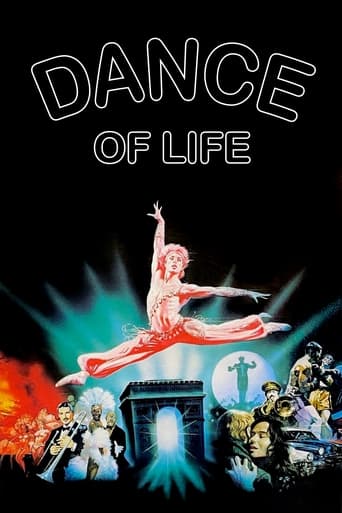Claudio Carvalho
Along three generations, the lives of different families in Russia, France, Germany and United States of America, all of them connected to music and dance, are affected by the World War II. In Russia, the Bolshoi ballerina Tatiana Itovitch (Rita Poelvoorde) loses her husband, the musician Boris Itovitch (Jorge Donn), in the Russian front. She raises alone their son, the professional dancer Sergei (Jorge Donn), who escapes from Soviet Union and coming to have a daughter, the also ballerina Tania. In France, the Jewish violinist Anne Meyer (Nicole Garcia) marries the pianist Simon Meyer (Robert Hossein), and both are sent to a concentration camp, where Simon dies. On the train travel to the camp, Simon leaves their baby son on the trails and he is raised by a priest, becoming the lawyer Robert Prat (Robert Hossein), who has a professional singer son. Also in France, in Paris after the war, the singer Evelyne (Evelyne Bouix) is accused of sleeping with the enemy, and moves to Dijon, where she has a daughter, Edith (Evelyne Bouix). In Germany, the pianist and conductor Karl Kremer (Daniel Olbrychski) leaves his wife Magda Kremer (Macha Méril) and their son to fight in the war. In USA, the famous pop singer Jack Glenn (James Caan) leaves his wife Suzan Glenn (Geraldine Chaplin) to join the army and entertain the troops in London. Their gay son Jason Glenn (James Caan) and daughter, the singer Sara Glenn (Geraldine Chaplin) become important persons in the show business. Their lives are entwined in a Red Cross presentation of the Ravel's Bolero in Paris. "Les Uns et les Autres" is the masterpiece of Claude Lelouch and is one of my favorite movies ever. First time I saw it I was amazed with such a magnificent story. The direction, the story, the cast, the soundtrack, the location, everything works perfectly in this overwhelming film. The long scenes are fantastically well filmed and Claude Lelouch was certainly inspired when he made this wonder. Only a couple of months ago, this DVD was released in Brazil by the Brazilian distributor "Classicline" and yesterday I saw it again, for my delight after twenty and something years. The unknown Sharon Stone has a minor uncredited participation in the end of the movie, watching the show on TV in bed with Jack Glenn. "Les Uns et les Autres" is a highly recommended movie, for lovers of arts and cinema. My vote is ten.Title (Brazil): "Retratos da Vida" ("Pictures of the Life")Note: On 10 February 2014, I saw this wonderful movie again.
michelerealini
This is probably the most famous Claude Lelouch's film - second only to "A man and a woman" (1966). While the latter has a very simple (and fascinating) structure, "Les uns et les autres" (also known as "Bolero") has a more complex and more ambitious layout.The film is a saga, it tells the story about four artist families from the Second World War to the Sixties. Lelouch works with some of the best French movie actors (Hossein, Garcia, Brialy, Villeret, Bohringer) and two stars like James Caan and Geraldine Chaplin. Music (excellent) is composed by Francis Lai and Michel Legrand, choreography is conceived by Maurice Béjart.The film is very long and slow, sometimes Lelouch is self-indulgent (some situations are set in a very maniacal way, we feel much perfectionism). But it is another captivating movie of this French director, who likes long shots and also lets many many images speak for themselves. I would say the film is a cinematic poem, full of lyricism. A love dedication to life and art.
talltale-1
Wow. I had seen a pared-down version of this amazing film when it was called BOLERO a decade or two back. Now that I have seen the uncut film, I'm in awe. As I grow older I seem to appreciate Claude Lelouch more and more. This one may be his masterpiece. Weaving together three generations and four families (German, French, American and Russian), the writer/director manages to run the gamut from wildly romantic to elegantly subdued (note the distanced reconciliation scene between mother and son late in the film) offering up whatever is called for at a given moment. Music is paramount to this movie--it is ever-present and holds the diverse threads together. The cast is amazing, too. What a coup. This is the kind of film I'll recommend to everyone, and now that it is out on DVD, movie lovers are all the luckier for it.
paul-475
I'm amazed how few have seen this fabulous movie. Though not as perfect as the directors' Les Miserables, it is still a superb classic. I always have found it difficult to understand at first viewing, I now realize that this probably due to heavy editing from the original six hour french version. I hope that some day it is released in it's entirety.


